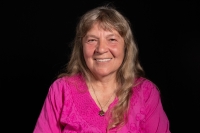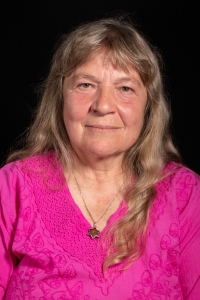The Kehilla was frequented by kindly old gentlemen and collaborators of the secret police
Download image
Sylvie Wittmannová was born on 27 July 1956 in Liberec. Both her parents probably came from partly Jewish families, but the fate of her Jewish ancestors during the World War II remains unclear. She grew up in Liberec alongside her half-brothers Robert and Michal, the latter of whom spent two years in an orphanage before her birth after her mother was arrested in 1952 as a “promoter of Zionism”. By the 1960s, the family was already living in Prague, and brother Robert was involved in the artistic happenings of Knížák’s Aktual band. In 1968, brother Michal remained in the West, while Robert emigrated in 1978, after signing the Charter 77. Sylvie did not receive a recommendation to study at the beginning of the normalisation, later she studied at the secondary library school and finally in the conservation and restoration school in Brno. From the 1970s onwards, she visited the Kehilla, for which she also did restoration work. She worked in various jobs, including at the reception desk of the Ambassador Hotel on Wenceslas Square, which brought her into contact with tourists from the West. It was probably because of her contacts with foreigners, but also with the Kehilla and the Charter community, that she was followed by the State Security. She is listed as an agent in the records of the Archive of Security Forces, but her volume was shredded in December 1989. She herself describes rather unsuccessful attempts by the secret police to invite her to meetings. In her own words, she did not sign or verbally agree to any cooperation. At the end of the 1980s, through spontaneously guiding tourists in Terezín, she got a job as a tour guide with the state-run Sport-turist travel agency, and after the revolution she set up a private travel agency. In 1994, she was at the birth of the Bejt Simcha (House of Joy) civic association, a Reform Jewish community that organizes services and cultural and social events.

